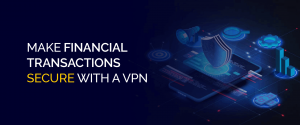

Get 93% OFF on Lifetime
Exclusive Deal
Don’t miss out this deal, it comes with Password Manager FREE of cost.
Get 93% off on FastestVPN and avail PassHulk Password Manager FREE
Get This Deal Now!By Johan Curtis No Comments 4 minutes
It’s been well-established that using a VPN offers a superior level of protection for your online activities. Sure, there are other benefits to VPNs, too, but the peace of mind provided by encrypting your traffic and hiding your IP address is one of the foremost reasons for using a VPN. Indeed, almost all surveys on VPN use cite security as the top attraction among internet users.

But, if the above is an established fact, what protection or impact does a VPN have on a financial transaction? To explain: the vast majority of financial transactions online are encrypted, at least at the process of the transaction. For instance, it’s very unlikely – almost impossible – that a PayPal transaction can be hacked in the process of execution. Your PayPal account can be compromised or hacked, and you can fall afoul of phishing scams, and so on. But the actual transaction is difficult for hackers to position themselves in “the process”.
Of course, it should thus go without saying that the VPN works on the auxiliary parameters of your financial transactions. As such, you can be relatively confident in the security of the transaction provided by PayPal. But you should also be aware that VPN use is helpful in creating the conditions for having a secure PayPal account by, for example, protecting your login credentials and securing your personal details via encryption.
Having both trust in the platform that you are using and the VPN to secure the attack vectors (the means for hackers to gain access to your data) is the key to understanding how VPNs work in tandem with financial transactions. A good example of where this all works is in the online casino sector. It is very, very uncommon to see any news reports of the compromisation of online casinos. This is due to the robust security they use for transactions, as well as the way they protect customers’ personal data.
Now the thing about online casinos is that they are perhaps more proactive than any other sector in striving to give players as much choice in terms of payment methods. Players want great games and bonuses, sure, but incentives like casinos with fast payouts also rank high when players choose a platform. Others might look for convenience, such as paying with a mobile phone bill, or even a lack of personal financial footprint, such as using Paysafecard, which requires the inputting of a code rather than any info with an underlying account. Consequently, operators are always offering a large range of options to suit each style of player.
If we return to the use of a VPN, then, once again, it is about eliminating the attack vectors, those points of entry for hackers. In the example of a casino, assuming it is licensed and follows the industry standards for encryption, then your transactions in and of themselves are safe. But there are always ways that the VPN can make it safer. For instance, a VPN offers robust protection for those using Public Wi-Fi. Many of us may play casino games when out and about on our smartphones, ranging from being in a hotel room to an airport to a train. It’s a weakness that allows snooping and possible compromisation of any online activity, not necessarily casinos. It’s a problem that a VPN solves.
Thus, we can argue that using a VPN is a smart way to protect your online financial transactions, even if the transaction itself is encrypted. Think of encrypted transactions like a vault that you have stored in your house. You might sleep well knowing that your cash and valuables are locked inside. But using a VPN will keep the doors and the windows of the house locked too. That’s likely to help you sleep a little better.
© Copyright 2025 Fastest VPN - All Rights Reserved.


Don’t miss out this deal, it comes with Password Manager FREE of cost.
This website uses cookies so that we can provide you with the best user experience possible. Cookie information is stored in your browser and performs functions such as recognising you when you return to our website and helping our team to understand which sections of the website you find most interesting and useful.
Strictly Necessary Cookie should be enabled at all times so that we can save your preferences for cookie settings.
If you disable this cookie, we will not be able to save your preferences. This means that every time you visit this website you will need to enable or disable cookies again.